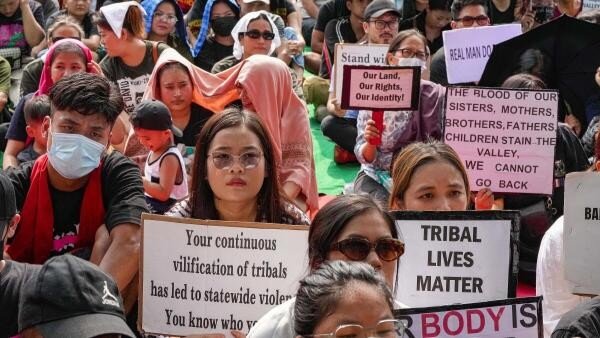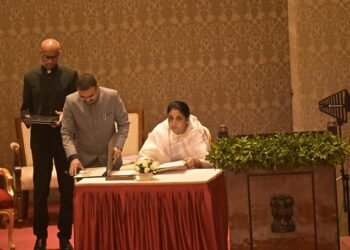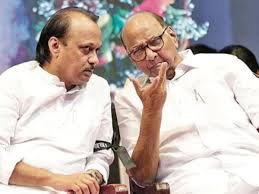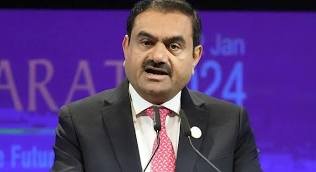Kuki-Zo leaders demand a Union Territory with a Legislature under Articles 239A & 244, ensuring protection of land, culture, and people’s rights.
BY Navin Upadhyay
October 12, 2025 – A historic conclave of the Kuki-Zo community concluded in Shillong, bringing together civil society organizations, legal scholars, representatives from national and regional think tanks, and leaders of Suspension of Operations (SoO) has issued a powerful call for solidarity and advocated for the establishment of a Union Territory with a Legislature under Article 239A of the Indian Constitution to ensure peace, justice, and constitutional protections for the Kuki-Zo people.
The two-day conclave concluded took place on October 10 and 11.
The conclave highlighted the pressing need for a comprehensive, politically negotiated settlement to end the crisis that has displaced thousands and intensified ethnic tensions since May 2023. Participants condemned the systemic marginalization and misrepresentation of the Kuki-Zo community, rejecting derogatory labels such as “illegal immigrants” and “narco-terrorists” as ethnically biased attempts to undermine their identity as Indian citizens.
“We reaffirm our deep-rooted connection to India and our unwavering commitment to upholding the Constitution,” the organizing committee declared in a statement.
A key resolution of the conclave was the demand for a Union Territory with legislative authority, reinforced by protective mechanisms under Article 244 to safeguard Kuki-Zo culture, land, and natural resources. The participants emphasized the importance of community-driven development to promote equitable economic participation and shield resources from external exploitation. Immediate priorities include enhancing access to roads, healthcare facilities, and educational institutions in Kuki-Zo areas to address the humanitarian crisis affecting internally displaced persons.
READ: The Tale of Unserved US Summons: Who is Shielding Adani?
The conclave expressed serious concerns about the impartiality of security forces and the Manipur administration, citing instances of targeted violence against Kuki-Zo individuals. It called for an impartial security framework, including buffer zones and neutral forces such as the Assam Rifles, to protect vulnerable populations. “United we stand, divided we fall,” the declaration emphasized, urging all Kuki-Zo factions to set aside minor differences and present a cohesive front in negotiations with the Central Government.
To promote inclusivity, the conclave extended an open invitation to all Kuki-Zo civil society groups to join a consensus-driven platform for dialogue. This platform seeks to strengthen political negotiations by fostering trust and mutual respect among stakeholders. The participants committed to ongoing internal deliberations to resolve differences and counter misrepresentations that threaten their collective struggle
The conclave represents a pivotal moment in the Kuki-Zo community’s pursuit of dignity, self-reliance, and justice. Organizers vowed to expedite future dialogues to secure their demands, emphasizing a sustainable path toward peace and development. “Our shared history and culture will guide us in shaping a future that upholds our rights and identity,” the committee stated, signaling a renewed commitment to their cause.
As the Kuki-Zo community seeks a fair and earnest response from the Central Government, the conclave’s outcomes underscore a broader call for unity in diversity, urging all stakeholders to work toward a resolution that restores peace with justice in Manipur.
READ: BJP Rewrites Bihar Power Script: JD(U) Loses Big Brother Status
DECLARATION OF THE SHILLONG CONCLAVE
The Shillong Conclave, convened to address the ongoing ethnic conflict in Manipur and the systemic marginalization of the Kuki-Zo community, brought together representatives from civil society organizations, legal experts, national and regional think tanks, and leaders of Suspension of Operations (SoO) groups. After intensive deliberations, the participants unanimously resolved to pursue a politically negotiated settlement to resolve the two-year-long crisis between the Meitei and Kuki-Zo communities. This declaration outlines the conclave’s key resolutions, emphasizing unity, constitutional safeguards, and a sustainable path toward peace, justice, and self-reliance for the Kuki-Zo people.
- Urgent Need for a Political ResolutionThe Shillong Conclave firmly believes that an immediate political resolution is the only viable path to address the Manipur crisis, which has caused widespread displacement and suffering since May 2023. The participants call for a comprehensive settlement aligned with the Indian Constitution, ensuring robust safeguards for the culture, land, and customs of the Kuki-Zo community. Central to this resolution is the demand for the establishment of a Union Territory with a Legislature under Article 239A of the Constitution, supported by protective mechanisms under Article 244. This framework aims to counter the severe marginalization and victimization faced by the Kuki-Zo people in Manipur’s tribal-dominated areas. Such a resolution would provide a moral and legal foundation for peace with justice, addressing the plight of internally displaced persons and victims of ethnic violence.
- Commitment to Unity and InclusivityThe conclave issued a resounding call for solidarity among all Kuki-Zo civil society groups, urging them to overcome internal divisions and factionalism. Recognizing the global attention on their struggle, the participants emphasized the importance of presenting a united front to achieve their shared vision of dignity and self-determination. To foster inclusivity, the conclave extended an open invitation to all Kuki-Zo civil society organizations to join a participatory, consensus-based platform for dialogue with the Central Government. This platform will prioritize mutual respect, trust, and good faith, ensuring that all stakeholders’ demands and aspirations are considered. The participants underscored that unity is critical to resisting external pressures and securing a just resolution, declaring, “United we stand, divided we fall.”
- Condemning Misrepresentation and Ethnic PrejudiceThe conclave strongly condemned the racist stereotyping and misrepresentation of the Kuki-Zo community, including derogatory labels such as “illegal immigrants,” “narco-terrorists,” and “refugees.” Such portrayals, often equating the Kuki-Zo with transnational groups from Myanmar, reflect deep-seated ethnic and communal prejudice. The participants also highlighted the systemic “othering” of the Kuki-Zo as tribal, Christian, and sometimes transnational, which undermines their identity as legitimate Indian citizens. Reaffirming their deep-rooted connection to India, the conclave declared the Kuki-Zo community’s unwavering commitment to upholding the Constitution. They demanded a corrected representation of their identity, emphasizing their equal citizenship and right to life, liberty, and dignity. The participants called for all stakeholders, including the Meitei community, to respect constitutional principles and reject divisive narratives.
- Strategic Roadmap for Political DialogueThe conclave outlined a strategic approach to dialogue with the Central Government, addressing both immediate and long-term demands to ensure sustainable development and governance for the Kuki-Zo community.4.1 Immediate Transitional NeedsThe participants emphasized the urgent need to address transitional issues, including:
Infrastructure Development: Ensuring operational roads, healthcare centers, and educational institutions up to the highest levels in Kuki-Zo areas.
Humanitarian Support: Providing relief and rehabilitation for internally displaced persons and victims of ethnic violence.
These measures aim to improve governance and quality of life until a final political settlement is achieved.4.2 Long-Term Constitutional SafeguardsThe conclave reiterated the demand for constitutional protections to secure community ownership and control over land and natural resources. This includes:
Land and Resource Rights: Guaranteeing the Kuki-Zo community’s sole authority over their forests, water sources, and cultural assets, protected from market-driven exploitation and external capital.
Sustainable Development: Promoting community-intensive development models that ensure equitable economic participation, job creation, and self-reliance, in line with constitutional ideals.
These safeguards aim to empower the Kuki-Zo community to sustainably manage their resources and preserve their cultural heritage for future generations.
- Ensuring Impartial Security and Community SafetyThe conclave expressed grave concern over the impartiality of security forces and the Manipur administration, citing incidents of targeted violence against Kuki-Zo individuals by state forces. To address this, the participants proposed:
Impartial Security Framework: Establishing buffer zones and deploying neutral forces, such as the Assam Rifles, free from interference by the Manipur government.
Community-Led Self-Defense: Strengthening mechanisms to protect vulnerable groups, including women, children, and the elderly, from ethnic violence.
The conclave emphasized that a credible security architecture is essential to restoring trust and ensuring the safety of Kuki-Zo areas. Unity among the community was highlighted as a prerequisite for resisting prejudiced actions by external forces.
- A Pledge for Future ActionThe conclave reaffirmed its commitment to sustaining the momentum of the Kuki-Zo struggle through continued dialogue and collective action. Key pledges include:
Internal Dialogue: Resolving minor differences within the Kuki-Zo community through inclusive discussions, ensuring a united approach to negotiations.
Countering Misrepresentations: Actively addressing deliberate misperceptions and misconceptions that undermine the community’s collective interests.
Future Deliberations: Organizing additional conclaves and dialogues to expedite the resolution of Kuki-Zo demands, with a focus on sustainable development and security.
The participants warned against actions that could weaken their collective resolve, urging all Kuki-Zo groups to prioritize their shared history, culture, and aspirations. The establishment of a Union Territory with constitutional protections remains the cornerstone of their vision, symbolizing their determination, fortitude, and fellowship.
- Appeal to Stakeholders and the Central GovernmentThe Shillong Conclave called on the Central Government to earnestly address the Kuki-Zo community’s core political demand for a Union Territory with legislative powers. The participants urged the government to engage in good-faith negotiations, ensuring that the voices of all stakeholders are heard and respected. The conclave also appealed to the broader Indian public and international community to recognize the Kuki-Zo struggle as a fight for dignity, equality, and justice within the framework of India’s Constitution. By fostering unity in diversity, the Kuki-Zo community seeks to contribute to a stronger, more inclusive India.
The Shillong Conclave marks a historic milestone in the Kuki-Zo community’s pursuit of justice, self-determination, and peace. Through this declaration, the participants reaffirm their commitment to a politically negotiated settlement that upholds their rights, protects their identity, and ensures a sustainable future. The conclave’s call for unity, constitutional safeguards, and impartial governance underscores the Kuki-Zo community’s resolve to overcome marginalization and build a brighter future for their people.











